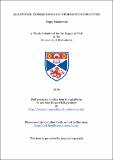Files in this item
Quantifier expressions and information structure
Item metadata
| dc.contributor.advisor | Ball, Derek Nelson | |
| dc.contributor.advisor | Dever, Josh | |
| dc.contributor.author | Mankowitz, Poppy | |
| dc.coverage.spatial | [4], 167 p. | en_US |
| dc.date.accessioned | 2019-02-22T12:50:34Z | |
| dc.date.available | 2019-02-22T12:50:34Z | |
| dc.date.issued | 2019-06-24 | |
| dc.identifier.uri | https://hdl.handle.net/10023/17137 | |
| dc.description.abstract | Linguists and philosophers of language have shown increasing interest in the expressions that refer to quantifiers: determiners like ‘every’ and ‘many’, in addition to determiner phrases like ‘some king’ and ‘no cat’. This thesis addresses several puzzles where the way we understand quantifier expressions depends on features that go beyond standard truth conditional semantic meaning. One puzzle concerns the fact that it is often natural to understand ‘Every king is in the yard’ as being true if (say) all of the kings at the party are in the yard, even though the standard truth conditions predict it to be true if and only if every king in the universe is in the yard. Another puzzle emerges from the observation that ‘Every American king is in the yard’ sounds odd relative to contexts where there are no American kings, even though the standard truth conditions predict it to be trivially true. These puzzles have been widely discussed within linguistics and philosophy of language, and have implications for topics as diverse as the distinction between semantics and pragmatics and the ontological commitments of ordinary individuals. Yet few attempts have been made to incorporate discussions from the linguistics literature into the philosophical literature. This thesis argues that attending to the linguistics literature helps to address these puzzles. In particular, my solutions to these puzzles rely on notions from work on information structure, an often overlooked area of linguistics. I will use these notions to develop a new theory of the pragmatics of ordinary discourse, in the process of resolving the puzzles. In the first two chapters, I provide accessible overviews of key notions from the literature on quantifier expressions and information structure. In the third chapter, I discuss the problem of contextual domain restriction. In the fourth chapter, I consider the problems posed by empty restrictors. In the final chapter, I tackle the issue of category mistakes. | en_US |
| dc.description.sponsorship | "This work was supported by the Universities of St Andrews and Stirling (SASP PhD Scholarship), and the Royal Institute of Philosophy (Jacobsen Studentship)." -- p. 1 | en |
| dc.language.iso | en | en_US |
| dc.publisher | University of St Andrews | |
| dc.subject | Quantifier expressions | en_US |
| dc.subject | Information structure | en_US |
| dc.subject | Language | en_US |
| dc.subject | Semantics | en_US |
| dc.subject | Pragmatics | en_US |
| dc.subject.lcc | P299.Q3M2 | |
| dc.subject.lcsh | Grammar, Comparative and general--Quantifiers | en |
| dc.subject.lcsh | Semantics (Philosophy) | en |
| dc.subject.lcsh | Pragmatics | en |
| dc.title | Quantifier expressions and information structure | en_US |
| dc.type | Thesis | en_US |
| dc.contributor.sponsor | St Andrews and Stirling Graduate Programme in Philosophy (SASP) | en_US |
| dc.contributor.sponsor | Royal Institute of Philosophy | en_US |
| dc.type.qualificationlevel | Doctoral | en_US |
| dc.type.qualificationname | PhD Doctor of Philosophy | en_US |
| dc.publisher.institution | The University of St Andrews | en_US |
| dc.identifier.doi | https://doi.org/10.17630/10023-17137 |
This item appears in the following Collection(s)
Items in the St Andrews Research Repository are protected by copyright, with all rights reserved, unless otherwise indicated.

